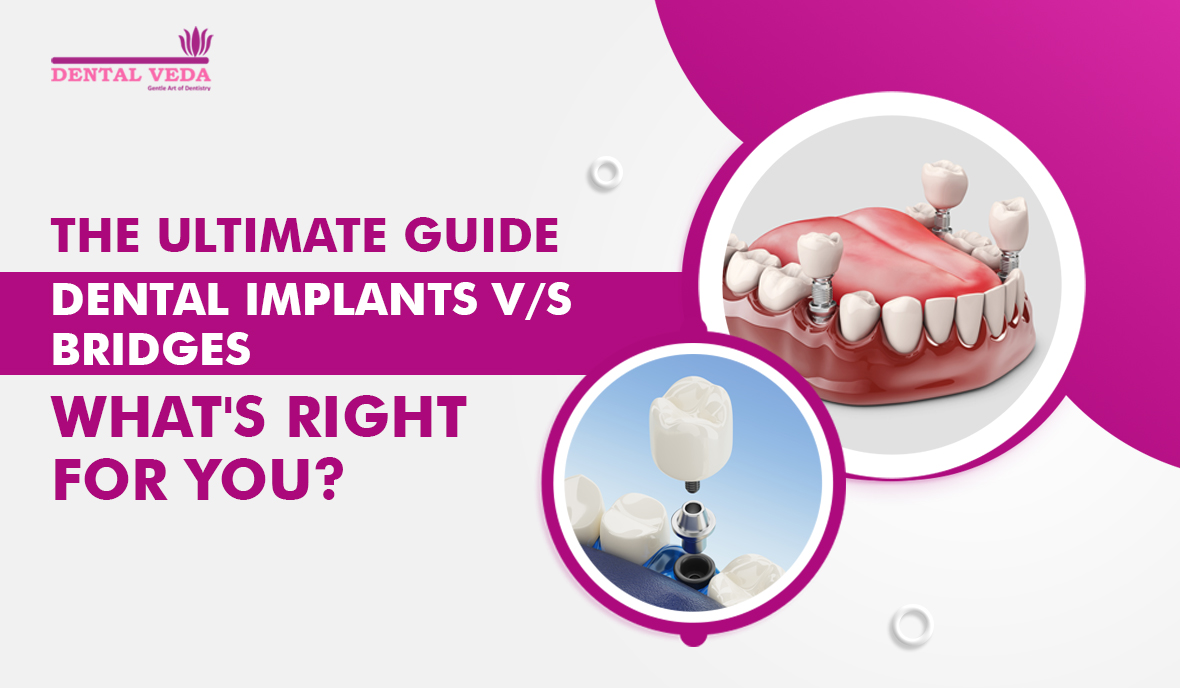Missing teeth can significantly impact your daily life, Dental Implants vs. Bridges affect your ability to chew, speak, and smile with confidence. Fortunately, advancements in dentistry offer various solutions to restore your smile and oral function. Two popular options are dental implants and bridges. (Modafinil online)
Both options have their own pros and cons, making it essential to understand the differences between them to make an informed decision about the most suitable solution for your unique dental needs.
Let’s compare the two options to determine which option might be the best fit for you:
What are Dental Implants?
A Dental implant is a safe, efficient, and long-lasting solution to address problems of missing teeth. It is an artificial tooth held in place by a titanium post surgically implanted into the jawbone beneath the gumline. This post acts as an artificial tooth root, providing a sturdy foundation for mounting a replacement tooth or crown.
Dental implants look and function like natural teeth. Dental implant placement involves several steps:
- Consultation and Assessment:
Your dentist evaluates oral health, bone density, and overall suitability for dental implants. A customized treatment plan is developed.
- Implant Placement Surgery:
In this surgical procedure, the post is placed into the jawbone. Local or general anesthesia is used to ensure a pain-free experience.
- Osseointegration:
Over a few months, the implant fuses with the jawbone, becoming a stable foundation for the replacement tooth.
- Abutment Placement:
Once osseointegration is successful, an abutment is attached to the implant, which connects the implant to the crown.
- Crown Attachment:
Finally, a custom-made crown, designed to match your natural teeth, is attached to the abutment.
Benefits of Dental Implants
- Durability and Longevity:
Dental implants are designed to last a lifetime with proper care and maintenance, offering a long-term solution for missing teeth.
- Natural Appearance:
Implants closely resemble natural teeth in appearance and function, providing a seamless and confident smile.
- Preservation of Jawbone Health:
Implants stimulate the jawbone, preventing bone loss and maintaining facial structure.
- Enhanced Functionality:
Dental implants provide a stable foundation for replacement teeth, allowing you to eat, speak, and smile with confidence.
- Preservation of Adjacent Teeth:
Dental implants don’t require altering adjacent teeth, promoting their long-term health and integrity
What are Dental Bridges?
Dental bridges are a popular dental restoration that offers a solution for individuals with missing teeth, helping restore the appearance and functionality of their smiles. They consist of one or more artificial teeth held in place by dental crowns attached to the adjacent natural teeth or implants.
The crowns are cemented onto the existing teeth on either side of the gap, effectively anchoring the artificial teeth in place. This anchoring ensures stability and allows the bridge to function like natural teeth, enabling normal chewing and speaking without discomfort or movement.
The procedure of implanting dental bridges includes
- Preparation of Abutment Teeth:
If you opt for a traditional bridge, the adjacent teeth (abutment teeth) are prepared by removing a portion of enamel to make room for the crowns.
- Impressions and Customization:
Detailed impressions of your teeth are taken to create a custom bridge that fits perfectly in your mouth, matching the shape and color of your natural teeth.
- Bridge Fitting:
A permanent bridge is fitted, adjusted for comfort and functionality, and cemented in place, completing the restoration.
Benefits of Dental Bridges
- Restores functionality:
Dental bridges enable you to chew and speak properly, restoring your ability to enjoy a variety of foods and communicate clearly.
- Cost-Effective:
Dental bridges are a cost-effective solution for replacing missing teeth, making them accessible to a broader range of individuals.
- Aesthetically Pleasing:
Bridges are designed to match the appearance of your natural teeth, enhancing your smile and facial aesthetics.
- Non-Invasive Procedure:
Compared to dental implants, getting a dental bridge is a less invasive procedure that typically requires less time for completion and recovery.
- Prevention of Shifting Teeth:
By filling the gap left by missing teeth, dental bridges prevent adjacent teeth from shifting into the empty space, maintaining the alignment of your bite.
Dental Implants vs. Bridges
To choose between dental implants and bridges, it’s crucial to compare each option based on various factors.
- Aesthetics
Dental implants closely resemble natural teeth, providing a seamless and natural appearance
While bridges offer a good aesthetic result, they may not look as natural as implants, especially in certain cases.
- Longevity
Dental implants are known for their durability and longevity, often lasting a lifetime with proper care, whereas bridges may need to be replaced every 10-15 years, making them a less permanent solution.
- Cost
Dental implants can be initially more expensive due to the surgical procedure and materials involved. Bridges are generally more cost-effective in the short term as they are less complex and involve fewer components.
- Procedure
The procedure for dental implants is invasive, involving the surgical placement of titanium posts into the jawbone. On the other hand, the bridge implantation procedure is non-invasive, typically requiring the reshaping of adjacent teeth and the creation of a custom-fitted prosthetic bridge.
- Maintenance
Maintenance is similar to natural teeth—regular brushing, flossing, and dental check-ups. Specialized cleaning tools are required to maintain proper oral hygiene under the bridge, which can be more challenging than caring for implants.
- Impact on Jawbone and Adjacent Teeth
Dental implants don’t affect adjacent teeth and help preserve jawbone health. On the other hand, bridges are cemented with adjacent teeth. This requires alteration to adjacent teeth, which can weaken them over time.
Who Are Ideal Candidates for Dental Implants and Bridges?
Dental Implants:
Dental implants may be the right solution for you if you have:
- sufficient bone density and a healthy jawbone structure
- healthy gums and maintain good oral hygiene practices
- good general health, free from uncontrolled chronic diseases or conditions that may interfere with the healing process
- a fully grown jawbone
Dental Bridges
Dental bridges may be the right solution for you if you:
- have healthy and strong adjacent teeth that can provide support for the bridge
- have good oral health, free from severegum disease
- are not a candidate for dental implants
- prefer non-invasive procedure
- are looking for a quicker solution to missing teeth
- are committed to maintaining good oral hygiene and regular dental check-ups to ensure the bridge’s longevity
Decision Making
Making the right choice between dental implants and bridges requires careful consideration and professional guidance. A consultation with your dentist is a crucial step in this decision-making process. During the consultation, your dentist will assess your oral health, lifestyle, preferences, and budget considerations. They’ll help you weigh the pros and cons, helping you make an informed decision between the two.
Reclaim Your Smile with Dental Veda
Are missing teeth affecting your confidence? Let the expert dentists at Dental Veda bring back your natural, radiant smile. Book your appointment today and take the first step towards a confident, complete grin. Reclaim your smile at Dental Veda!
Frequently Asked Questions
Can I get dental implants if I have gum disease?
It’s essential to have healthy gums before getting dental implants. If you have gum disease, your dentist will recommend treating it first before proceeding with implant surgery to ensure a successful outcome.
Can I get a bridge if I’m missing multiple teeth?
Yes, dental bridges can be used to replace multiple missing teeth. Depending on the number and location of missing teeth, your dentist will recommend an appropriate type of bridge to restore your smile and functionality.
Will dental implants or bridges affect my speech?
Dental implants and bridges are designed to function like natural teeth, so they should not significantly affect speech. In fact, they can help improve speech for those who have difficulty speaking clearly due to missing teeth.


